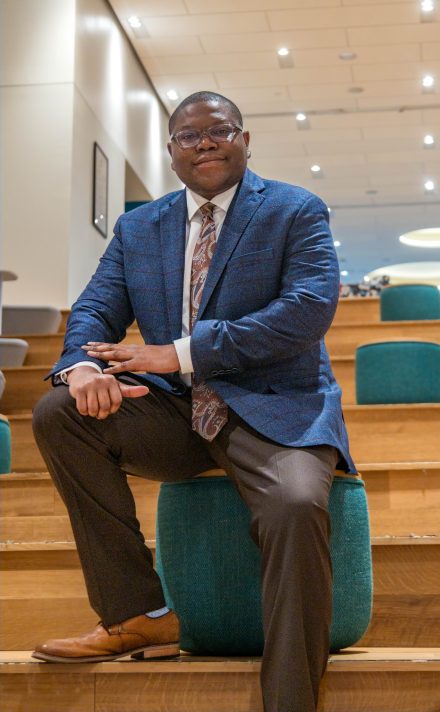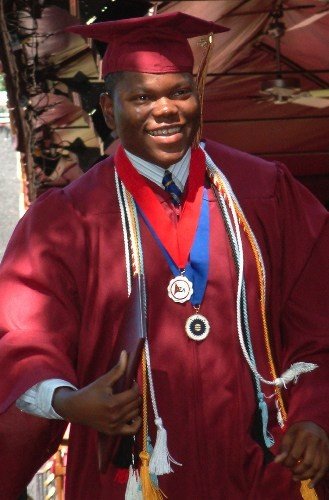Means is currently an associate professor at University of Pittsburgh's School of Education and has a goal to build networks that focus on addressing racial, class, spatial inequities and injustices in education.
 Developing initiatives to shape college student success is a top priority for Darris Means ’05.
Developing initiatives to shape college student success is a top priority for Darris Means ’05.
Means currently serves as an associate professor and Dean’s Faculty Scholar in Equity, Justice and Rural Education at the University of Pittsburgh’s School of Education, and a 2021-22 Richard P. Nathan Policy Fellow for the Rockefeller Institute of Government.
The South Carolina-native first learned about Elon through his high school Spanish teacher whose daughter went to Elon. Means decided to look into the university more and after his very first visit to campus, he was hooked. As an undergraduate Elon student, Means majored in sociology and political science and also immersed himself in research.
“I knew Elon could be a place where I could thrive as a student,” said Means.
While at Elon, he became engaged in research focused on campus racial climate in higher education. “Dr. Tom Henricks served as my advisor and my research mentor, and I learned a lot from him and the undergraduate research experience. My undergraduate research experience was my first realization that I may want to pursue a research career,” said Means.
An active student on campus, his time at Elon didn’t just involve his studies, but also included Student Government Association, a service-learning community experience, serving in the Pi Kappa Phi Fraternity and the Interfraternity Council and also working as an Admissions university guide. After graduation he was also personally selected by President Emeritus Leo M. Lambert as the Youth Trustee for the Board of Trustees for Elon, serving a two-year term.
Means went on to earn his master’s degree in student affairs from Clemson University. He then returned to Elon University to serve on the founding staff for the Elon Academy, a college access and success program for high school students with financial needs or no family history of college.
“I am a first-generation college student who received the maximum Pell Grant, a need-based federal grant, so the opportunity to learn from and work with Elon Academy students and families is one of the most impactful professional experiences I have had in my life,” said Means.
During his more than seven years with the Elon Academy, Means served as both assistant director and associate director. He credits his passion for this work to the student mentors and colleagues he had from Elon, such as Deborah Long, who was the director of the Elon Academy when he started with the program. Means returns to Elon every summer, apart from the summer of 2020 due to the pandemic, to teach in the Elon Academy summer residential program. “The Elon Academy changed the trajectory of my career,” said Means.
Means also earned his Ph.D. in educational research and policy analysis with a concentration in higher education from North Carolina State University. During his Ph.D. program, he uncovered his love for teaching and aimed to pursue faculty positions upon finishing his degree. His first faculty position was at the University of Georgia as an assistant professor of college student affairs administration, before transitioning into his current role as an associate professor in the School of Education at the University of Pittsburgh in August 2020.
“Since 2007, I have dedicated my career to studying and addressing inequities experienced by Black students, Latinx students, first-generation college students, students from low-income and working-class backgrounds, LGBTQ students and rural students during their educational trajectories,” said Means.
 His undergraduate research that focused on campus racial climate in education eventually progressed into his career. In his current role as a Dean’s Faculty Scholar, he helps to strengthen the relationship between the University of Pittsburgh’s School of Education and rural communities, districts and schools. “Our goal is to develop a strategic plan that could guide our rural education initiatives, programs and collaborations,” said Means.
His undergraduate research that focused on campus racial climate in education eventually progressed into his career. In his current role as a Dean’s Faculty Scholar, he helps to strengthen the relationship between the University of Pittsburgh’s School of Education and rural communities, districts and schools. “Our goal is to develop a strategic plan that could guide our rural education initiatives, programs and collaborations,” said Means.
Means also engages in public service, as well as leading and co-leading research studies. In 2017, he collaborated with University of Georgia’s Julie Dangremond Stanton on a $300,000 National Science Foundation study focused on the persistence of Black students in science. He and his colleagues sought to inventory what resources are available to support Black students while also investigating how racial inequities and racism hinder success.
Means also works in conjunction with undergraduate student researchers to implement real-world change. Through this project, they have developed online modules for science faculty and staff to better support Black science majors. Means explains, “Our goal is not to just examine Black students’ experiences but to also develop evidence-based products to address the challenges identified in our scholarship.”
In 2020, he served on the research advisory board at the Joan Ganz Cooney Center, the research and innovation lab of Sesame Workshop. He was a part of the launch of By/With/For/Youth: Inspiring Next Gen Public Media Audiences, a project that seeks to support the public media sector in developing innovative strategies to better engage tweens and teens.
With an interest in scholarship related to educational policy, he knew that being a Richard P. Nathan Policy Fellow of the Rockefeller Institute of Government was something he wanted to do, and this year he had the opportunity to hold this prestigious title as a 2021-22 Fellow. In this role, he has collaborated with a team of graduate and undergraduate students across five states to study one of his many initiatives – how state policy and context shape rural college student success. They have collected and analyzed state legislative records and newspaper articles to understand how state policymakers and leaders are supporting postsecondary education enrollment and completion for rural students.
“I am proud to say that during my career, I have graduated 17 doctoral advisees, including 15 Black scholars, who are advancing equity and justice through higher education practice and scholarship…I’ve learned how to be a better teacher, scholar, and advisor based on what I have learned from former doctoral advisees.” -Darris Means ’05
Means says that it is his time at Elon that prepared him to lead in the face of challenges. He feels that the support and encouragement received from faculty and staff were key to his success at Elon, and that the faculty and staff are the reason why the university has such successful alumni.
“Elon taught me the importance of placing community care, equity and servant-leadership at the center of how I approach everything I do as a faculty member,” explained Means.
The future looks bright for Means. He has a goal to build networks that focus on addressing racial, class, spatial inequities and injustices in education; as well as the initiative to become more engaged in reciprocating scholarship findings to the public through writing more op-eds and research-practice briefs. Eventually, he hopes that he can also explore avenues to share scholarship via film and photography, all in an effort to make his findings known to others in hopes that it will encourage and inspire change.
“I don’t want my scholarship to only be useful for other scholars; I want my scholarship to be accessible to practitioners, the general public and policymakers,” said Means.


